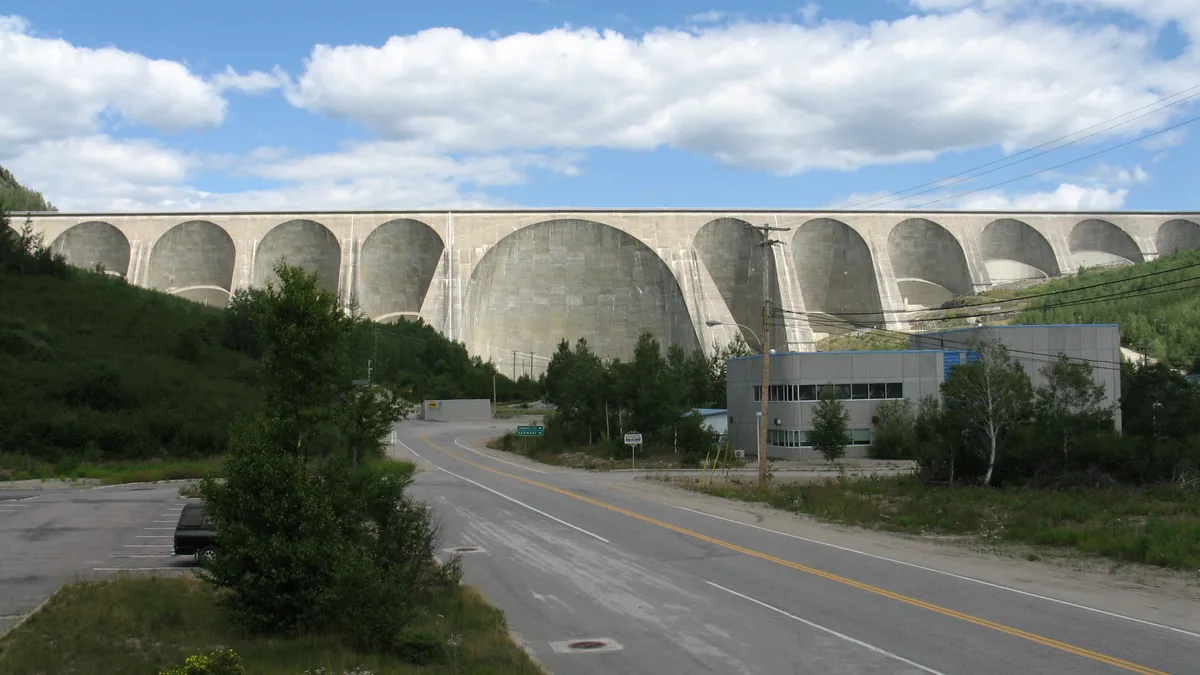Dive Brief:
- The Massachusetts Supreme Court ruled in favor of the state's Department of Public Utilities (DPU) on Thursday, upholding power purchase agreements (PPAs) the regulators had awarded last year to Hydro-Québec.
- The DPU had approved PPAs to provide 9,554,940 MWh annually from Hydro-Québec, starting by Dec. 31, 2022. The long-term energy contracts are important to advancing the development of a controversial transmission line, New England Clean Energy Connect (NECEC), which continues facing opposition in Maine.
- NextEra Energy Resources, an independent power producer in the region with more expensive, aging resources, such as the nuclear Seabrook Plant, alleged in the lawsuit that the hydroelectric generation was not eligible for the contracts, as it could not be provided without interruption as a "firm service."
Dive Insight:
Hydroelectricity is facing similar scrutiny as wind and solar PPAs, although the Massachusetts regulators concluded service interruptions would occur with hydro "only in limited circumstances."
"We conclude that the department reasonably and realistically interpreted the firm service requirement," the state Supreme Court opinion said.
Hydro-Québec is trying to sell power to the New England region and New York, and "merchant generators are trying to stop it, essentially, through a variety of ways, whether it's lobbying ... or legal challenges," said Paul Patterson, an analyst at Glenrock Associates.
Hydro-Québec has proposed a Champlain Hudson Power Express transmission line to move a large amount of hydroelectricity underground to New York City, which independent power producers in the state say would not lower emissions in the region.
Merchant generators "have a hard enough time as it is in the current power markets and don't really want to see a whole bunch of additional supply show up thanks to Hydro-Québec," Patterson said.
"New England has been a pretty anemic market in terms of demand growth," and generators in the region have been pressed to stop an increase in cheaper renewable energy supply to the region, as it could push out existing assets, he said.
Arguments over cheaper renewables pushing out baseload generation have cropped up in most wholesale markets, and grid operators are working on mitigating the impacts of clean energy subsidies to allow units with baseload generation to continue operation.
The Hydro-Québec PPAs would use the New England Power Pool Generation Information System (NEPOOL GIS), a tracking system that would account for each unit of transmitted electricity. The petitioners, including NextEra, claimed the system is inadequate for compliance with the clean energy statute in the state code, Section 83D.
The state court also upheld the DPU's conclusions that "the PPAs guarantee electricity generated solely from hydroelectric generation and that the NEPOOL GIS tracking system is an adequate means to ensure the required accounting."
With the ruling by the state's highest court, the next steps for the petitioners are unclear.
NextEra Energy Resources was supported with an amicus brief from the New England Power Generators Association (NEPGA). NextEra and NEPGA did not respond to requests for comments on the consequences of the ruling.
In August, the NECEC received another win when the Maine Supreme Court ruled that the construction of the project, which crosses through western Maine, could not be overturned under the state's constitution. Avangrid and its subsidiary, Central Maine Power, opposed attempts to place a referendum in November to overturn state regulatory approval for the project.
CORRECTION: A previous version of this story misstated Avangrid's role in the NECEC project. Avangrid and its subsidiary are seeking to build the transmission line in Maine and opposed referendum efforts that could overturn approval for the project.















